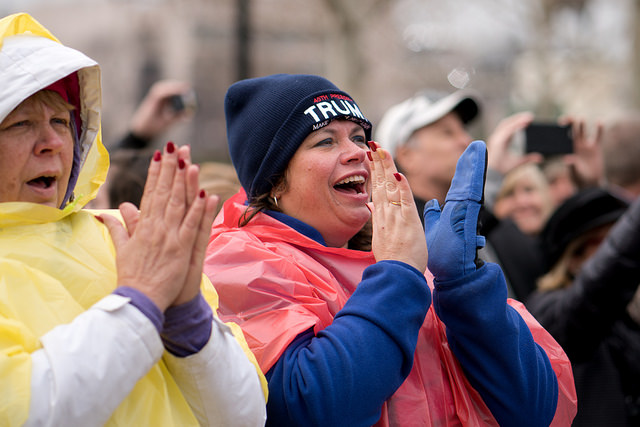
“Stop covering politics,” some of our dear readers cry every time we post something relephant. Look: politics are life. Equal rights, empathy, fair economy, healthcare. We can’t ignore what’s happening, and you shouldn’t either.
Elephant Journal articles represent the personal views of the authors, and cannot possibly reflect Elephant Journal as a whole. Disagree with an Op-Ed or opinion? We’re happy to share your experience here. ~ Ed.
~
Pat Robertson, host of the Christian news and TV broadcast, The 700 Club, recently accused Trump’s detractors of “revolting against what God’s plan is for America.”
As one of those detractors, not only will I continue to revolt against Trump’s plan for America, but if there is a God and his plan for America looks anything like the first 30 days of Trump’s presidency, I will happily revolt against him as well.
On its face, Robertson’s statement is ludicrous. There is, however, a subtle implication hidden within that I would like to address.
In the mind of Robertson and his fundamentalist followers, God’s will is the infallible agenda of a divine being. So, when Pat Robertson conflates Trump’s agenda with God’s plan for America, he is saying that Trump’s words and actions are the standard by which truth and righteousness are measured. If Trump says it or if his White House orders it, then it must be true and good because it is through Trump that God’s plan is being carried out.
The number of people who consciously subscribe to such theocratic rhetoric is probably negligible. However, I would argue that the number of people who implicitly accept the basic premise is significant. Trump’s supporters see him as the standard-bearer of truth and righteousness, because in him they find confirmation of their own worldview.
An individual’s worldview is their cognitive orientation toward the world. It is a constellation of ideas that we use to map out the terrain and navigate our territory. In short, the individual’s worldview is the operating system of their conscious mind.
Think of ideas as living entities. Like all living entities, they struggle to survive and propagate themselves. In the world of ideas, the best way to ensure survival is to create an inbred system of consciousness where incoming information is measured against pre-existing ideas. This closed system enables the individual to incorporate any information that reaffirms or further secures their basic worldview, while rejecting disagreeable propositions. Additionally, any information that is not pertinent to their worldview is deemed “irrelevant” and simply ignored. This inbred system establishes our worldview as the metric by which the truth and value of information is measured. This is called confirmation bias.
Confirmation bias is the tendency to interpret information through the lens of preconceived ideas. This phenomena is not limited to Trump supporters. Nor is it new. People on the left and the right have suffered this shortcoming for as long as there has been a left and a right. But the competing worldviews of the left and the right have grown further apart in recent years. In fact, I believe we are living in a political singularity where the two competing worldviews are so divergent that compromise is not possible. Politics has become a zero-sum game, the winner of which will determine the trajectory of American politics for the foreseeable future.
In a Fox News interview, Rush Limbaugh recently said, “People who voted for Donald Trump really believed they would lose the country if Hillary won.” I suspect that many liberals woke up on November 9th with similar feelings.
Trump’s movement is antithetical to everything the left—and some moderate Republicans—believe. He did not create this movement. It has been lurking beneath the surface. He just tapped into it and introduced it to the mainstream. A representative democracy cannot function without compromise, so the introduction of “Trumpism” will force a political realignment—whether the center will move toward the left or the right remains to be seen.
Trump’s movement is a form of nationalism, similar to that which is seen in Russia. It is a brand of nationalism that dabbles in racism, but its central impetus is traditionalism. It equates national identity with right-wing, Judeo-Christian ideals and unapologetically defends that identity against secularization.
“I certainly think secularism has sapped the strength of the Judeo-Christian West to defend its ideals,” said Steve Bannon, Trump’s top adviser, in a speech at the Vatican.
The Trumpist worldview sees immigration and the rising tide of secularization, globalization, religious pluralism, and egalitarianism as signs of impending doom. And all of this is exacerbated by terrorism. His supporters are frustrated by “political correctness,” which, in their view, is nothing more than rules of engagement that shield the liberal agenda from criticism and transform traditional beliefs into social taboos. In Trump, his supporters see someone who is willing and able to wage the kind of culture war required to preserve their worldview and therefore their identity.
In the same Fox News interview, Limbaugh raised another point I agree with, though I do not relish it as he does. He said, “Trump has a connection with his voters that most politicians don’t. And that connection is not anything that anybody else can break.” Trump’s supporters are identified with him. In him they see themselves. So, for Trump to be wrong, they must be wrong, which is a difficult sale because the mind is structured to resist this claim.
I don’t think he enjoys this messianic status with everyone who voted for him, but there is a core group of 35 to 40 percent of his supporters who see him as the cult-like avatar of their consciousness. In their eyes, Donald Trump can do no wrong because right and wrong are defined by the values that constitute their worldview, and he is the personification of that worldview.
For example, opinion of Vladimir Putin skyrocketed amongst Republicans when Trump’s curious relationship with him came into focus. Forced to decide whether Trump was in the wrong or Putin—a corrupt and murderous autocrat—had been unfairly maligned by the West, 27 percent of Republicans adopted a more favorable opinion of Putin. When you add that 27 percent to the 10 percent who already saw Putin in a favorable light, you find Trump’s 37 percent core support.
These are the people he was referring to when he said, “I could stand in the middle of 5th Avenue and shoot somebody and I wouldn’t lose voters.”
Nothing can sever the connection between Trump and his core supporters. Not the media, not other Republicans, not even reality.
They can hear him on a hot mic bragging about sexually assaulting women and still believe him when he says, “No one has more respect for women than I do, believe me.” Built into the relationship between Trump and his supporters is the belief that any criticism of Trump is part of the conspiracy to undermine his supporters core beliefs and values. They react viscerally to attacks against Trump because they experience them as personal attacks.
Donald Trump is the L. Ron Hubbard of the Republican Party.
He has successfully tapped into the identify of a large swath of Republican voters. For his core supporters, Trump’s agenda may as well be God’s plan for America.
How do you combat that? How do you convince a group of people that the person they are identified with, the very personification of their values and beliefs, is a fraud? You don’t. Their minds will work tirelessly to minimize and justify any objection you raise. Because to do otherwise would be for them to forfeit their identity.
The West is at a political crossroads.
The far-right has known this for years. People like Steve Bannon have been preparing for this fight for a decade, while moderates and progressives have taken progress for granted. It seems that we are awakening from our naive slumber. But we must remain vigilant.
We must continue to call our Congressmen, mobilize, and speak out. When Donald Trump organizes pep rallies, we must organize protests in response. For every starry-eyed sycophant he calls on stage, we need 10,000 people voicing opposition.
Our fear of confrontation—or worse, our indifference—will likely have political ramifications that reverberate for generations to come. The opposition has absorbed much of the electorate, so the margin of error is thin.
We have underestimated him and his support base once before and cannot afford to do so again.
~
A great many people see politics as a distraction from spirituality. But is it really “spiritual” to ignore our civic responsibility and avoid those uncomfortable conversations? Or does an authentic spirituality demand that we enter those conversations? In this short episode of my podcast I talk about the relationship between politics and spirituality.
~
Author: Benjamin Riggs
Image: Lori Shaull/ Flickr
Editor: Khara-Jade Warren








Read 1 comment and reply